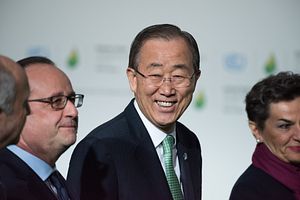United Nations Secretary-General Ban Ki-moon has stirred excitement on his ongoing visit to his native South Korea by leaving the door open for a presidential bid next year.
Neither confirming nor denying an interest in running for South Korea’s top job, the UN chief said he would “return as a Korean” to his home country on January 1, after his term ends as one of the leaders of the free world — 11 months before the December 2017 election.
“When I come back from the UN, I will ponder more about my role as a citizen. But right now, it would be most appropriate for me to successfully take on my current calling and report back to you,” he said Wednesday on the sidelines of the Jeju Peace Forum.
The rumor has long been brewing, through no fault of Ban’s. During the months of political turmoil in the lead up to South Korea’s April parliamentary elections, dismayed citizens sought an image free from the political tit-for-tats that tore apart both main parties. Ban has emerged as a favorite in several polls since last year, most recently topping liberal Minjoo Party leader Moon Jae-in 38 percent to 34.4 percent, with liberal defector turned People’s Party leader Ahn Cheol-soo grabbing 21.4 percent.
For his part, Ban, formerly a South Korean foreign minister, has never confirmed an interest in the job. While largely staying out of domestic affairs, he made the rare move of acknowledging the country’s deep divisions, declaring that “somebody who is ready to give up everything for national integration should come forward.” If he were to run, observers predict that making peace with North Korea through diplomacy would be high on Ban’s platform.
He met with President Park Geun-hye several times last year, leading to speculation that he would run for her ailing Saenuri Party. The party, which tumbled from its majority status after being stripped of 30 seats last month, has fallen out of public favor due to several of the presidential office’s controversial platforms, such as an anti-terrorism law, history textbook revisions, and labor law reform. Saenuri has yet to find a fresh face to lead its revival.
The public and Saenuri Party may largely welcome the idea, but whether Ban should — or could — take on the post is the subject of growing controversy. Seoul Mayor Park Won-soon, another rumored potential candidate, argued that UN secretary-generals, who have accessed confidential information over their tenure, could “abuse” that information as an official of a single government.
As a globally and locally respected diplomat, Ban has the potential to unify the country in a way that has rarely been experienced during Park’s term. But whether Ban would even want to enter the futile game of domestic politics will be closely watched.
































